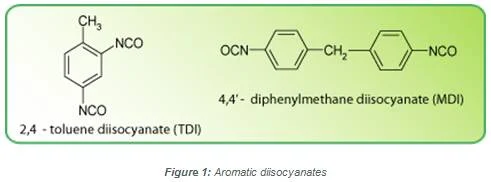Since the late 1940s, diisocyanates — a family of versatile chemical building blocks — have been utilized to make polyurethane products, such as rigid and flexible foams, coatings, adhesives, sealants and elastomers (CASE). Many of the products we rely upon every day are enhanced because of diisocyanates.
Diisocyanates Explained

Diisocyanates used in polyurethane production are divided into two types: aromatic diisocyanates and aliphatic diisocyanates.
Aromatic Diisocyanates
There are two primary aromatic diisocyanates: toluene diisocyanate (TDI) and methylenediphenyl diisocyanate (MDI).
- TDI is used primarily in the production of flexible foams.
- MDI, the second type of DII, comes in two forms: pure MDI and polymeric MDI (PMDI).
- Pure MDI is used in the production of a variety of polyurethane products like coatings, adhesives, sealants and elastomers (CASE) such as paints, glues, and weather resistant materials.
- PMDI is a highly versatile product used to produce a wide variety of rigid, flexible, semi-rigid, and polyisocyanurate and thermoset foams.
There are also less common aromatic diisocyanates, such as p-phenylene diisocyanate (PPDI) and naphthalene diisocyanate (NDI).
What Is TDI?
Toluene diisocyanate (TDI) is used in the production of polyurethanes, primarily for flexible foam applications including bedding and furniture, carpet underlay, as well as packaging applications. TDI is also utilized in the manufacture of coatings, sealants, adhesives, and elastomers. In transportation applications, TDI is used to help make automobile parts lighter, leading to improvements in vehicle fuel efficiency and thus energy conservation.
What Is MDI?
Methylenediphenyl diisocyanate (MDI) is used in the production of polyurethanes for many applications, including the manufacture of rigid polyurethane foams used for home and refrigerator insulation. Insulation made with MDI can help consumers conserve energy.
Some additional uses of MDI in polyurethanes include coatings, adhesives, sealants, and elastomers (CASE) found in items such as paints, glues, and weather resistant materials. It is also used to make many types of footwear, sports and leisure products and to a much lesser extent, some specialty flexible foams. MDI can also be used as a binder for wood and to produce mold cores for the foundry industry.